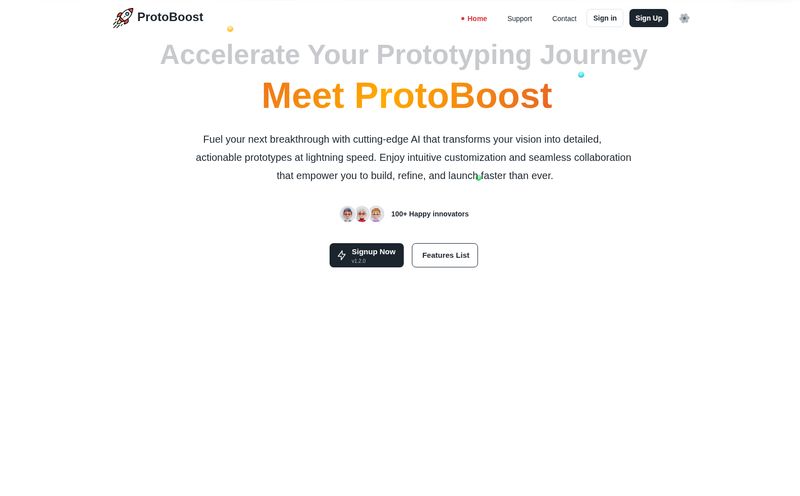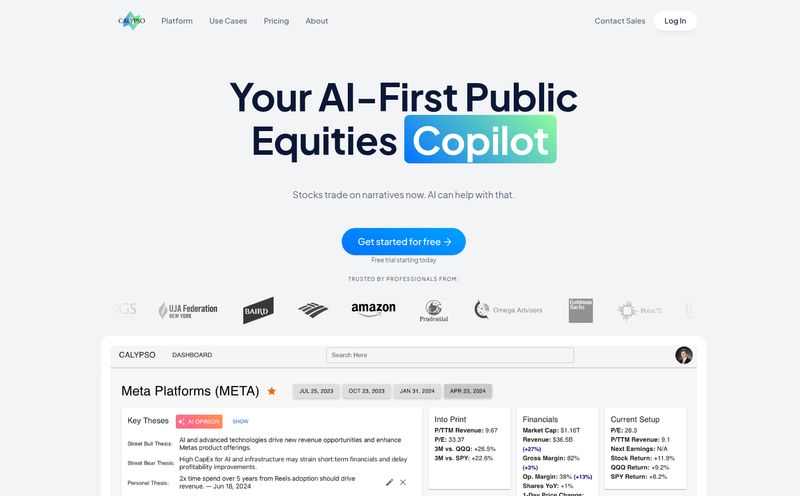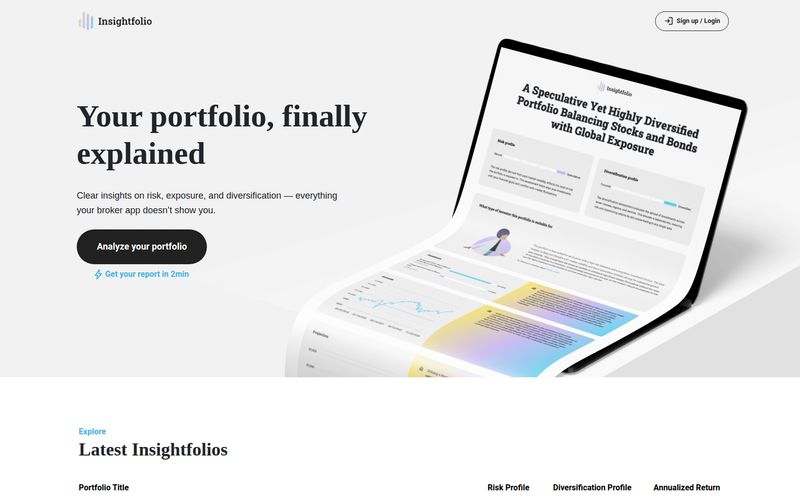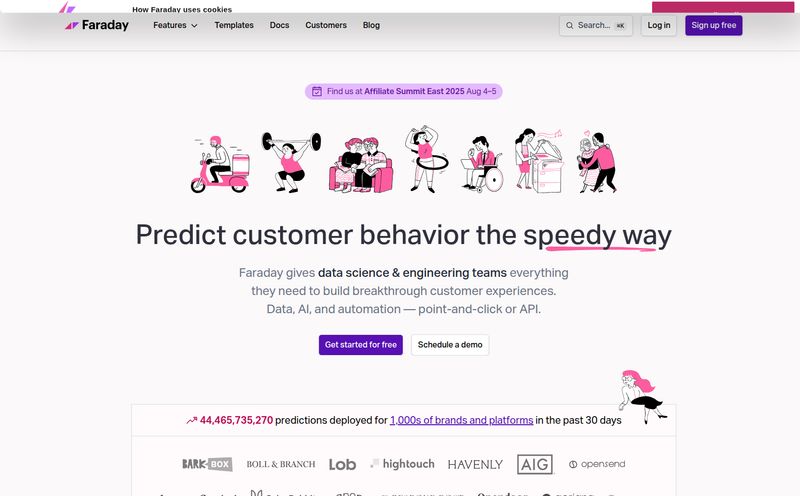Every so often, a new tool pops up on my radar and my spidey-sense starts tingling. You know the feeling. It’s that mix of excitement and deep, professional skepticism that comes from seeing a thousand “game-changing” platforms come and go. The latest one to catch my eye is called Activazon, and it's making some pretty big promises about community intelligence and AI-powered insights.
In a world where we're drowning in data but starving for wisdom, the pitch is seductive. We have Zillow for property estimates, Yelp for business reviews, and a dozen news apps for local happenings. But it’s all so… scattered. Trying to piece together a complete picture of a neighborhood—for an investment, a move, or even a marketing campaign—feels like assembling a jigsaw puzzle in the dark.
So, when Activazon claims it can be the single source of truth for decision-makers, I’m intrigued. But I'm also cautious. Let’s pull back the curtain and see if there’s a wizard behind it, or just another app blowing smoke.
What Exactly Is Activazon? (More Than Just a Crime App)
At its core, Activazon positions itself as a “Community Intelligence” platform. It started life, from what I can gather, as more of a crime report analytics service. A noble and useful starting point, for sure. We all want to know what’s happening on our street corner. But it seems to have broadened its horizons considerably.
Now, it’s aiming to be a comprehensive dashboard for a neighborhood’s entire ecosystem. Think of it less as a security camera and more as a high-altitude drone, mapping out the entire landscape. It uses AI—the magic pixie dust of the 2020s—to sift through mountains of data and deliver reports on everything from real estate trends and new construction to which local coffee shop is about to go under. The goal is to give investors, and even savvy residents, a real edge.
This isn't just about avoiding a bad neighborhood; it's about spotting the next big thing. It's about seeing the subtle shifts that signal growth or decline before they show up in last quarter's numbers.
The Core Features That Caught My Eye
Looking at their site, they’ve boiled their offering down to five key areas. Let’s break them down, not just by what they are, but why they matter.
Real Estate Trends with an AI Twist
This is the big one for a lot of people. Activazon claims to provide AI-powered reports on property values, market shifts, and investment opportunities. This goes beyond a simple Zestimate. The idea is to connect the dots between, say, a new transit line being approved and the potential appreciation of homes within a half-mile radius. As someone who has spent far too many hours cross-referencing city planning documents with MLS listings, the thought of a tool doing that heavy lifting is… well, it’s pretty appealing.
Keeping Tabs on Local Business
Here’s an angle I find particularly interesting for my SEO brain. The platform tracks business openings and closures. For an investor, that’s a direct indicator of a neighborhood's economic health. A string of new boutique openings? Bullish sign. A bunch of “For Lease” signs popping up? Red flag. For a marketer, this is pure gold. Imagine getting an alert about every new business in a 10-mile radius that fits your client profile. That’s powerful stuff.
Crime and Safety Reports (The OG Feature)
This is Activazon’s foundation. Understanding community risk and safety changes is fundamental. It impacts property values, business viability, and, of course, quality of life. While other apps do this, the hope is that Activazon’s AI can provide more nuance—distinguishing between a one-off incident and a developing trend, for example.
Infrastructure and Policy (The Boring but Important Stuff)
Okay, I’ll admit it, my eyes usually glaze over when I read about zoning laws and infrastructure bonds. But the grown-up investor in me knows this is where the real money is made. Activazon promises to keep you informed about road expansions, city planning, and new regulations. Their own blog has posts about things like the TCJA Expiration, which shows they're thinking about the serious, long-term financial implications of policy. Knowing a new light rail is coming in five years is the kind of alpha that separates smart money from the rest of us.
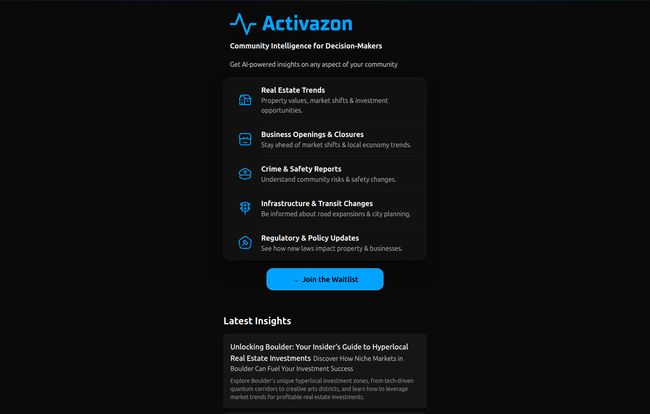
Visit Activazon
The Good, The Bad, and The Waitlist
Alright, let’s get down to brass tacks. No tool is perfect, especially one that hasn’t fully launched yet. Based on what we know, here’s my honest assessment.
On the plus side, the concept is a home run. A unified dashboard for hyperlocal data is a genuine need. The AI-powered approach, if done right, could uncover insights that are simply impossible to find manually. For both a house-hunting couple and a small real estate fund, the ability to get ahead of market shifts is a massive advantage. It’s proactive, not reactive.
But then there are the cons. And the biggest one is right there on the homepage: a big, blue “Join the Waitlist” button. The service isn’t openly available. This creates hype, sure, but also frustration. We can’t kick the tires. We can’t test its accuracy. We’re taking their word for it.
Which brings me to my next point: data transparency. Where is all this information coming from? Public records? Scraped data? Proprietary sources? For a tool that lives and dies by the quality of its data, there’s surprisingly little information about their sources or their methods for ensuring accuracy. It’s a black box. A shiny, promising black box, but a black box nonetheless. I've always been a bit wary of AI solutions that don't give you a peek under the hood.
Who Is This Tool Actually For?
So who should be signing up for that waitlist? I see a few key personas.
- The Serious Real Estate Investor: This is the obvious one. From small-time landlords to larger firms, anyone looking to build a data-driven investment thesis will see the potential here.
- The Data-Driven Real Estate Agent: An agent who can walk into a listing presentation armed with this level of hyperlocal insight would have a serious leg up on the competition.
- Local SEOs and Marketing Agencies: Like I said, the business opening/closing data is a lead-gen machine waiting to happen. It's also great for hyper-targeted campaign planning.
- The Extremely Thorough Homebuyer: For the person who wants to know everything before they make the biggest purchase of their life, this could be the ultimate research tool.
It’s probably overkill for the casual browser, but for anyone making a significant financial decision based on location, Activazon is at least speaking the right language.
The Million-Dollar Question: What About Pricing?
This is the other big mystery. There's no pricing page, no mention of tiers or costs. Nothing. This usually points to an enterprise-first model, where they'll be targeting larger firms with custom contracts. I could also see a tiered system—maybe a free or low-cost version for residents with basic alerts, and a pricey “pro” version for investors with all the deep analytics.
Personally, I hope they consider a more accessible model. The democratization of data is a powerful thing, and walling this kind of intelligence off to only the wealthiest players would feel like a missed opportunity.
My Final Take: Is Activazon Worth Watching?
Yes. Absolutely. Despite the waitlist and the unanswered questions, the concept behind Activazon is too compelling to ignore. They are trying to solve a real, complex problem that affects a lot of people and a lot of money.
The success of this platform will hinge on two things: the quality and accuracy of their data, and their ability to make the AI insights genuinely actionable and easy to understand. It’s one thing to have the data; it’s another to present it in a way that tells a clear story.
I’ve put my name on the waitlist. I suggest you do too. It might turn out to be another flash in the pan, but it also might just be the hyperlocal crystal ball we’ve all been looking for. And I don’t want to be the guy who missed out.
Frequently Asked Questions About Activazon
- Is Activazon free to use?
- Currently, there is no public information on Activazon's pricing. The service is only available by joining a waitlist, which suggests that pricing details will be revealed closer to a public launch or to those who are granted access. It might follow a tiered or enterprise model.
- Where does Activazon get its data from?
- This is a key question that hasn't been fully answered by the company yet. It's presumed they use a mix of public records, government data feeds, and possibly other third-party or proprietary sources. The lack of transparency on data sources is a notable point of concern for potential users.
- How is Activazon different from Zillow or Trulia?
- While platforms like Zillow and Trulia are primarily real estate marketplaces focused on property listings and valuations, Activazon aims to be a broader “community intelligence” tool. It integrates data far beyond real estate, including crime stats, business openings/closures, local policy changes, and infrastructure projects to provide a more holistic view of a neighborhood’s health and future potential.
- Who would benefit most from using Activazon?
- The primary audience appears to be decision-makers who need deep, localized insights. This includes real estate investors, developers, savvy real estate agents, local marketing agencies, and even very diligent homebuyers or community members who want to stay informed.
- What kind of AI does Activazon use?
- Activazon states it uses AI to power its insights, but the specifics of their models (e.g., machine learning, natural language processing) are not public. The goal of the AI is to analyze diverse datasets to identify trends, correlations, and predictive indicators that a human analyst might miss.
- Is Activazon available everywhere?
- Since the platform is still in a waitlist phase, its geographic coverage is not yet clear. Typically, data-intensive services like this launch in major metropolitan areas first before expanding their coverage. You would likely need to check with them directly once you get off the waitlist.
Conclusion
At the end of the day, Activazon is a fascinating prospect. It represents the next logical step in the evolution of data tools: moving from siloed information to integrated intelligence. The promise is huge, but the execution is everything. For now, it remains a promising player on the sidelines. I'll be watching from the stands—and from my spot on the waitlist—to see if it’s ready for the big leagues.
